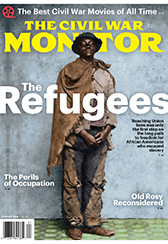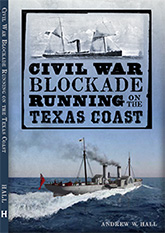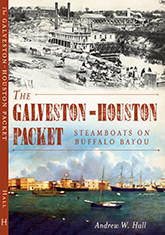Celebrating Independence Day in Vicksburg, 1877
[This post originally appeared here on July 4, 2011.]
It’s a common trope that the citizenry of Vicksburg, Mississippi, did not celebrate the Fourth of July until well into the 20th century. While it’s certainly true that the anniversary of the fall of that city to Grant in 1863 continued to resonate with Vicksburg residents down through the years, in fact the date was observed by plenty of local residents, white and black, even if the celebration was unofficial and somewhat more muted there than elsewhere. And they were celebrating it even when the war itself was a recent memory. From the Vicksburg Daily Commercial, July 3, 1877:

To-morrow being the anniversary of our Nations independence, all patriotic citizens of this great Republic are expected to observe it as a holiday. We desire to be reckoned among this class of patriotic citizens, consequently no paper will be issued from this office to-morrow. The glorious Fourth happens to come in hot weather this year, and we are glad to be able to observe it ‘neath the shade of country forests.
![]()
And a follow-up, on July 5:
![]()
The people of Vicksburg came nearer celebrating the glorious Fourth yesterday than they have done for several years. True, there was no general suspension of business, as indicated by closed doors, but so far as the profits of trade were concerned doors might as well have been closed, for the salesrooms were deserted almost entirely. Everybody was out of town, apparently, enjoying the holiday in some way. Several hundred people attended the Hibernian picnic at Newman’s Grove, and not withstanding the extreme heat, all seemed to enjoy the festivities of the day. The colored population turned out in large force, fully one thousand men of them going down the river on excursion boats to picnic-grounds, yet there were enough of them left in the city to form a very respectable procession of colored Masons, and a very large audience to listen to the oration of Judge J. S. Morris, and to assist in laying the corner-stone of King Solomon’s Church. There was no prolific display of fire-works on the streets, but occasional reports from fire-crackers and large torpedoes could be heard, accompanied now and then by a patriotic cry, “rah for the Fourth of July!” We do not wonder at the lack of patriotic enthusiasm displayed on our streets. No amount of patriotism could have induced any sane man to exert himself very considerably on such a day when the thermometer registered very nearly 100° Farenheit [sic.] in the shade. However, the observance of Independence Day yesterday, slight as some may have thought it, was yet sufficient to indicate the prevalence of a broader National sentiment and a determination to at least partially forget the past which renders the Fourth of July especially distasteful to Vicksburgers, and make it in future “The Day We Celebrate” as much as any other National holiday.
![]()
To be sure, the Fourth of July remained a bitter date for many Vicksburg citizens, for a long time. Undoubtedly there are some who still reject the date as one for celebration. But in this, as in so much else about the legacy of the war, the reality is more complex than the mythmakers would have one believe.






My Civil War ancestor died in 1865 after six months of service with a Wisconsin regiment that participated in the Siege of Vicksburg. He left behind a wife and two sons who were born in Prussia and a daughter born in Wisconsin, as well as a stepson who assumed his surname on reaching the age of majority. A few months ago I heard from a third cousin twice removed in Tampa, Florida, a descendant of my Civil War ancestor through my great grandfather’s older brother. My genealogical research filled a major gap in my cousin’s otherwise highly detailed and fairly complete family tree. Grandchildren of Civil War veterans had a tendency to marry grandchildren of Civil War veterans. My e-mail dialogue with my long lost cousin appears to be the first real contact in more than a century between descendants of my Prussian born great grandfather and descendants of his Prussian born older brother. I did hear briefly from another cousin from that wing of the family about eight years ago (she even searched some census records for me) when I first started chasing down my genealogy, but it freaked her out so much she’s never gotten back to me.
That’s neat. (Not so much about the cousin who freaked out, but you know. . . .)
My g-g-grandfather was with the 30th Alabama at Vicksburg, and participated in the defense and, after it was overrun by a Federal assault on May 22, recapture of the Railroad Redoubt. Many years later he received a disability pension due to ongoing intestinal problems he ascribed to having to eat “pea bread” during the siege.
My great great grandfather’s regiment occupied a bluff overlooking the Yazoo River alongside Sherman before he had really distinguished himself. It was their first real action in the war and they suffered ill effects from disease in the months immediately after Vicksburg. They went north from there to Helena and then across Arkansas to Little Rock in August, arriving there in August at substantially less than half strength with most of the unit either hospitalized or on furlough with something they called the red dysentery. Could that have been cholera? They weren’t back to full strength until nearly six months later. More than 200 men in the regiment died of disease and the majority of those deaths came in the six months after Vicksburg. My Civil War ancestor didn’t join the regiment until January in 1865, but nearly half of the men in his company were from the township where he lived in Wisconsin, so he would have been familiar with most of their ordeals during the two previous years.
The company he joined was originally organized by a man named Sam Hubbard, who faced a court martial and was dismissed in April 1864. My guess would be he was charged with insubordination. The regiment was commanded by a German immigrant, Colonel Krez, and I suspect Captain Hubbard may have felt a certain sense of slighted entitlement as a native born American.
My great grandfather’s older brother became a millwright and moved his family from Wisconsin to Findlay, Ohio in 1890 when Standard Oil of New Jersey struck oil there. He and his wife had three sons and two daughters when they moved. The three sons all died of diphtheria in April of 1893. The two daughters survived and the couple had a fourth son in 1894. One of the daughters eventually married the son of a Captain Gilbert, who had organized a company in an Ohio regiment from Findlay that took part in the Siege of Vicksburg. Gilbert resigned his commission after only two years, apparently dissatisfied with the way the war was being conducted. His grandson married a girl whose mother’s maiden name was Hubbard. She was from Kenosha, Wisconsin where one of her ancestors had designed and built the first Congregational church. I pointed out to my cousin in Florida that the captain of the ship that brought my great great great grandparents from London to New York when they emigrated from Prussia to Wisconsin in 1855 was also named Hubbard. I’m getting worried. I’d hate to think I might be a blood relative of L.Ron Hubbard.
“I’d hate to think I might be a blood relative of L.Ron Hubbard.”
Yeah, that would keep me up at night, too.
You think I’m joking. I went to junior high and high school in the same county where Hubbard and his family lived while he established himself as a science fiction writer, a west coast navy town. I was there because my dad was developing community mental health services on federal grants through and for the navy. Hubbard was second generation navy, visiting much of the Asia-Pacific region as a navy brat. He enlisted as a commissioned officer a year before Pearl Harbor. His odd behavior as an officer drew the attention of the naval psychiatric community. I knew virtually nothing of his strange biography until I looked it up on wiki a week or two ago when Tom Cruise and Katie Holmes announced their impending divorce.
My cousin’s Hubbard line goes back to Ipswich, England by way of the Massachusetts Bay Colony. Abolitionism was in their DNA.